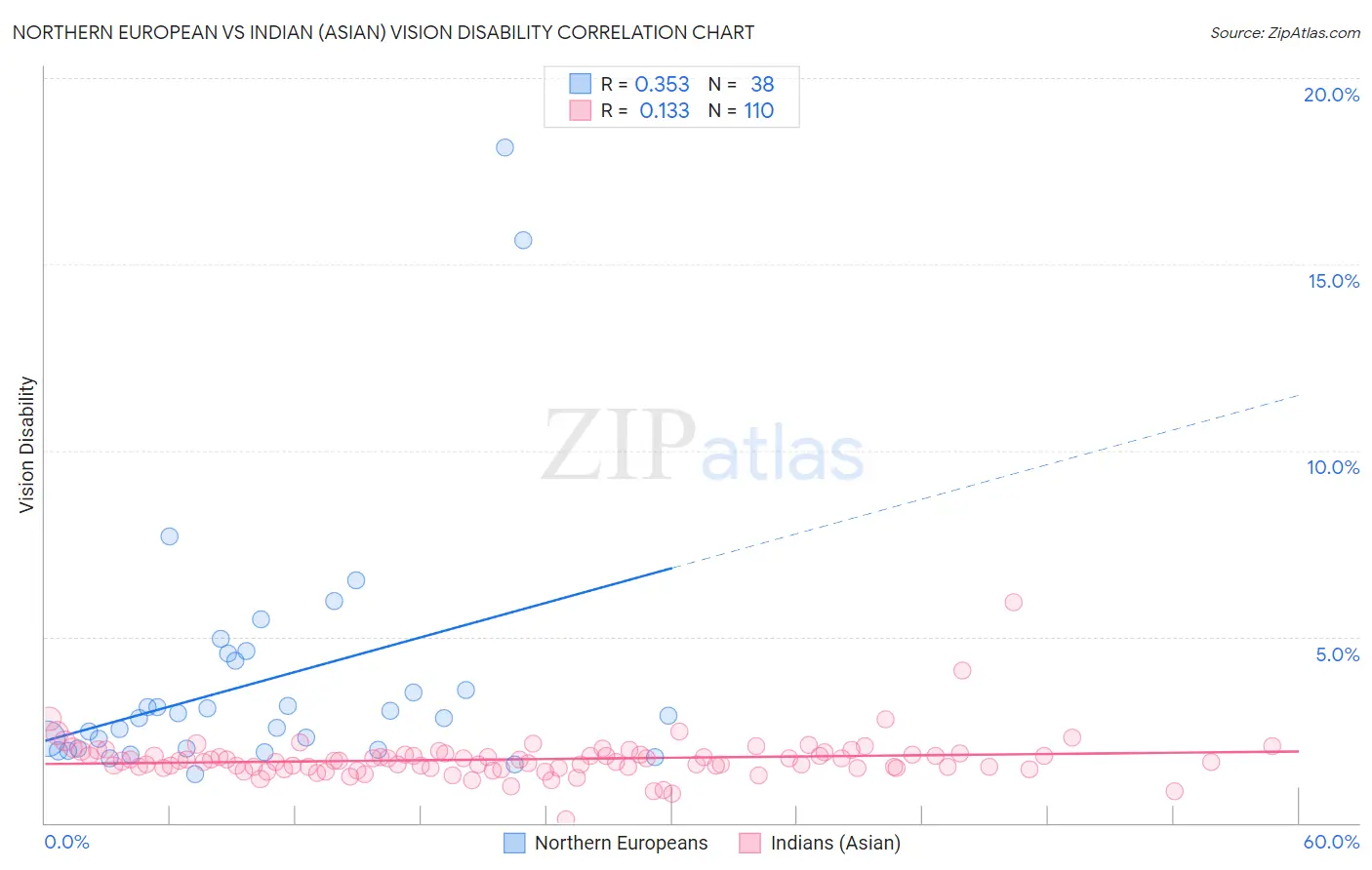Northern European vs Indian (Asian) Vision Disability
COMPARE
Northern European
Indian (Asian)
Vision Disability
Vision Disability Comparison
Northern Europeans
Indians (Asian)
2.2%
VISION DISABILITY
50.1/ 100
METRIC RATING
172nd/ 347
METRIC RANK
1.8%
VISION DISABILITY
100.0/ 100
METRIC RATING
16th/ 347
METRIC RANK
Northern European vs Indian (Asian) Vision Disability Correlation Chart
The statistical analysis conducted on geographies consisting of 405,711,615 people shows a mild positive correlation between the proportion of Northern Europeans and percentage of population with vision disability in the United States with a correlation coefficient (R) of 0.353 and weighted average of 2.2%. Similarly, the statistical analysis conducted on geographies consisting of 494,549,615 people shows a poor positive correlation between the proportion of Indians (Asian) and percentage of population with vision disability in the United States with a correlation coefficient (R) of 0.133 and weighted average of 1.8%, a difference of 17.1%.

Vision Disability Correlation Summary
| Measurement | Northern European | Indian (Asian) |
| Minimum | 1.3% | 0.11% |
| Maximum | 18.1% | 5.9% |
| Range | 16.8% | 5.8% |
| Mean | 3.8% | 1.7% |
| Median | 2.8% | 1.7% |
| Interquartile 25% (IQ1) | 2.0% | 1.5% |
| Interquartile 75% (IQ3) | 4.4% | 1.8% |
| Interquartile Range (IQR) | 2.4% | 0.36% |
| Standard Deviation (Sample) | 3.5% | 0.60% |
| Standard Deviation (Population) | 3.4% | 0.60% |
Similar Demographics by Vision Disability
Demographics Similar to Northern Europeans by Vision Disability
In terms of vision disability, the demographic groups most similar to Northern Europeans are Scandinavian (2.2%, a difference of 0.0%), Immigrants from Canada (2.2%, a difference of 0.010%), Immigrants from Fiji (2.2%, a difference of 0.16%), Yugoslavian (2.2%, a difference of 0.22%), and Lebanese (2.2%, a difference of 0.26%).
| Demographics | Rating | Rank | Vision Disability |
| Immigrants | Iraq | 64.8 /100 | #165 | Good 2.1% |
| Immigrants | England | 62.8 /100 | #166 | Good 2.1% |
| Immigrants | Africa | 62.6 /100 | #167 | Good 2.1% |
| Brazilians | 62.2 /100 | #168 | Good 2.1% |
| South American Indians | 57.4 /100 | #169 | Average 2.2% |
| Swiss | 55.7 /100 | #170 | Average 2.2% |
| Lebanese | 54.3 /100 | #171 | Average 2.2% |
| Northern Europeans | 50.1 /100 | #172 | Average 2.2% |
| Scandinavians | 50.0 /100 | #173 | Average 2.2% |
| Immigrants | Canada | 50.0 /100 | #174 | Average 2.2% |
| Immigrants | Fiji | 47.6 /100 | #175 | Average 2.2% |
| Yugoslavians | 46.5 /100 | #176 | Average 2.2% |
| Slavs | 46.0 /100 | #177 | Average 2.2% |
| Immigrants | Oceania | 45.1 /100 | #178 | Average 2.2% |
| Immigrants | North America | 44.5 /100 | #179 | Average 2.2% |
Demographics Similar to Indians (Asian) by Vision Disability
In terms of vision disability, the demographic groups most similar to Indians (Asian) are Burmese (1.8%, a difference of 0.010%), Bolivian (1.9%, a difference of 0.42%), Immigrants from Bolivia (1.8%, a difference of 0.44%), Immigrants from China (1.8%, a difference of 0.87%), and Immigrants from Eastern Asia (1.8%, a difference of 1.0%).
| Demographics | Rating | Rank | Vision Disability |
| Immigrants | Singapore | 100.0 /100 | #9 | Exceptional 1.8% |
| Immigrants | Hong Kong | 100.0 /100 | #10 | Exceptional 1.8% |
| Immigrants | Israel | 100.0 /100 | #11 | Exceptional 1.8% |
| Immigrants | Korea | 100.0 /100 | #12 | Exceptional 1.8% |
| Immigrants | Eastern Asia | 100.0 /100 | #13 | Exceptional 1.8% |
| Immigrants | China | 100.0 /100 | #14 | Exceptional 1.8% |
| Immigrants | Bolivia | 100.0 /100 | #15 | Exceptional 1.8% |
| Indians (Asian) | 100.0 /100 | #16 | Exceptional 1.8% |
| Burmese | 100.0 /100 | #17 | Exceptional 1.8% |
| Bolivians | 100.0 /100 | #18 | Exceptional 1.9% |
| Immigrants | Sri Lanka | 100.0 /100 | #19 | Exceptional 1.9% |
| Asians | 100.0 /100 | #20 | Exceptional 1.9% |
| Turks | 100.0 /100 | #21 | Exceptional 1.9% |
| Immigrants | Pakistan | 100.0 /100 | #22 | Exceptional 1.9% |
| Immigrants | Asia | 99.9 /100 | #23 | Exceptional 1.9% |